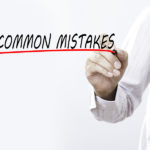What Estate Planning Mistakes Do People Make?

Estate planning for any sized estate is an important responsibility to loved ones. Done correctly, it can help families flourish over generations, control how legacies are distributed and convey values from parents to children to grandchildren. However, a failed estate plan, says a recent article from Suffolk News-Herald titled “Estate planning mistakes to avoid,” can create bitter divisions between family members, become an expensive burden and even add unnecessary stress to a time of intense grief.
Here are some estate planning mistakes to avoid:
This is not the time for do-it-yourself estate planning.
An unexpected example comes from the late Chief Justice of the Supreme Court Warren Burger. He wrote a 176 word will, which cost his heirs more than $450,000 in estate taxes and fees. A properly prepared estate plan could have saved the family a huge amount of money, time and anxiety. This example also points out that even brilliant legal minds make mistakes if they aren’t experts in this area!
Don’t neglect to update your will or trust.
Life happens and relationships change. When a new person enters your life, whether by birth, adoption, marriage or other event, your estate planning wishes may change. The same goes for people departing your life. Death and divorce should always trigger an estate plan review. Clients often confront this estate planning mistake at this time of year as part of new years resolutions or as part of a financial check-up with their financial advisors, so now is an excellent time to consider it.
Don’t be coy with heirs about your estate plan.
Heirs don’t need to know down to the penny what you intend to leave them but be wise enough to convey your purpose and intentions, at least to the individuals in charge of the plan. If you are leaving more uneven amounts to children for example, it may be a kindness to explain why to your love ones. Otherwise, they will be forced to come up with their own answers, which may lead to fighting. If you want your family to remain a family, share your thinking and your goals.
If there are certain possessions you know your family members value, making a list those items and who should get what. This will avoid family squabbles during a difficult time. Often it is not the money, but the sentimental items that cause family fights after a parent dies. Some of the worst estate disputes I’ve ever dealt with were over sentimental items.
Clients often ask about this topic, so see this article if you are interested in more information. https://galligan-law.com/how-to-avoid-family-fighting-in-my-estate/
Understand what happens if you are not married to your partner.
Unmarried partners do not receive many of the estate tax breaks or other benefits of the law enjoyed by married couples. Unless you have an estate plan in place, your partner will not be protected. Owning property jointly is just one part of an estate plan. Sit down with an experienced estate planning attorney to protect each other. The same applies to planning for incapacity. You will want to have appropriate incapacity planning documents such as financial and medical Powers of Attorney so that you may speak with each other’s financial institutions and medical providers.
Don’t neglect to fund a trust once it is created.
It’s easy to create a trust and it’s equally easy to forget to fund the trust. That means retitling assets that have been placed in the trust or adding enough assets to a trust, so it may function as designed. Failing to retitle assets has left many people with estate plans that did not work. Happily this is a very easy estate planning mistake to correct, though you should consult an attorney on how to properly utilize your trust.
Don’t be naive about people you put in charge of your estate plan.
It is not pleasant to consider that people in your life may not be interested in your well-being, but in your finances or other self-serving motivations. However, we see this all the time. This concern must be confronted honestly, even when it is children, during the estate planning process. Elder financial abuse and scams are extremely common. Family members and seemingly devoted caregivers have often been found to have ulterior motives. Be smart enough to recognize when this occurs in your life.
Reference: Suffolk News-Herald (Dec. 15, 2020) “Estate planning mistakes to avoid”

